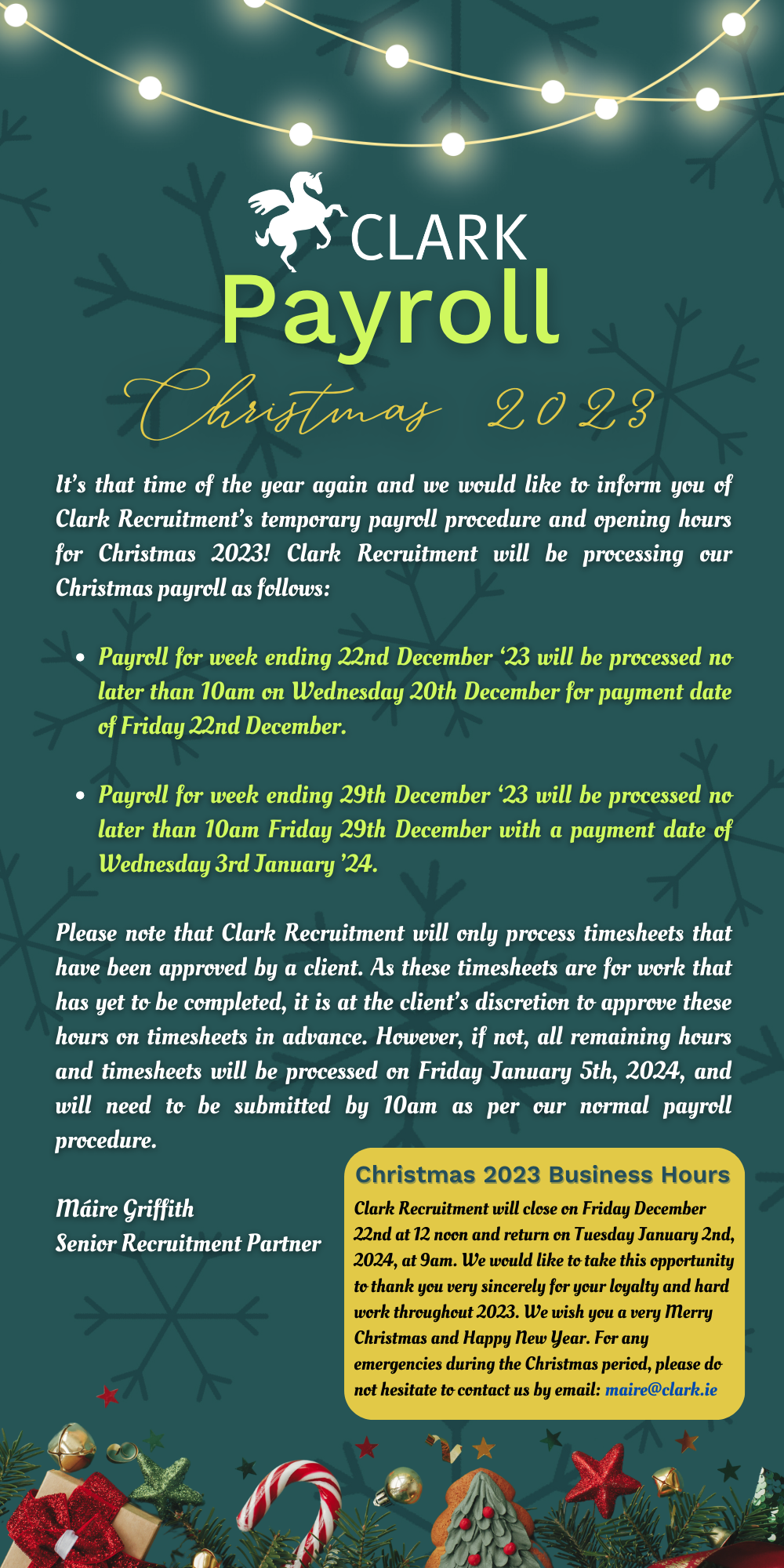Temporary Payroll Information – Christmas 2023
Christmas is coming and we are getting organised. 🎅🎄 See attached some information for our temporary staff regarding payroll over the Christmas period.
If you have any queries in relation to your pay please do not hesitate to reach out to us on 045 881888.

Bouncing Back After Redundancy: Your Guide to Reinvention
Facing redundancy can be a challenging and unsettling experience, but it’s also an opportunity for personal and professional growth. In this thought leadership blog, we will provide valuable advice to workers who have recently been made redundant. We’ll guide you through three critical phases: what to do in the immediate aftermath of being informed of redundancy, how to present yourself and the situation as you start job hunting, and what to do if your usual role or industry doesn’t have many job opportunities.
Part I: The Immediate Aftermath
Receiving the news of redundancy can be emotionally overwhelming. Here’s how to navigate the immediate aftermath:
Take Time to Process
Emotional Space: Give yourself permission to feel the emotions that come with job loss—anger, sadness, confusion. It’s entirely natural to need time to process.
Why: Acknowledging your emotions and allowing yourself to process them is essential for your mental well-being.
Understand the Terms of Redundancy
Clarify the Situation: Seek a clear understanding of the terms and conditions of your redundancy, including severance packages, notice periods, and any other benefits.
Why: Being informed about the legal aspects of your redundancy ensures you are treated fairly.
Lean on Your Support System
Emotional Support: Reach out to friends, family, or a counselor to discuss your feelings and concerns. Share your experience and let others provide emotional support.
Why: A strong support system can help you navigate the emotional challenges and uncertainties of redundancy.
Update Your Financial Plan
Financial Review: Review your financial situation and create a budget to manage your expenses during your job search.
Why: Financial planning can alleviate stress and ensure you remain financially stable during your job transition.
Part II: Job Hunting and Presenting Yourself
As you begin your job search, it’s crucial to present yourself effectively:
Build a Positive Narrative
Storytelling: Develop a narrative about your redundancy that is focused on change and growth. Highlight your achievements and the skills you’ve gained in your previous role.
Why: A positive narrative helps you approach interviews with confidence and positions you as a valuable candidate.
Update Your Resume and Online Presence
Resume Refresh: Tailor your resume to emphasize your transferable skills and accomplishments. Update your LinkedIn profile with your new career goals.
Why: A well-crafted resume and online presence enhance your visibility to potential employers.
Network Actively
Networking Efforts: Leverage your professional network to seek job leads, referrals, and information about potential opportunities.
Why: Networking is a valuable resource for discovering job openings and gaining insights into the job market.
Hone Your Interview Skills
Interview Preparation: Practice your interview skills, focusing on discussing your redundancy confidently and emphasizing your capabilities.
Why: Interview preparation boosts your chances of success and helps you convey your worth to potential employers.
Part III: Exploring New Opportunities
If your previous role or industry doesn’t offer many job opportunities, consider these strategies:
Assess Transferable Skills
Skill Evaluation: Identify skills that are transferable to other industries or roles. Evaluate how these skills can be applied in different contexts.
Why: Transferable skills can bridge the gap between your previous experience and new career opportunities.
Explore New Industries
Industry Research: Investigate industries or sectors that are experiencing growth or are in need of professionals with skills similar to yours.
Why: Exploring new industries can uncover previously unconsidered career paths.
Upskilling and Training
Skill Enhancement: Consider acquiring new skills or certifications that make you more competitive in industries with growing demand.
Why: Lifelong learning is key to adapting to evolving job markets.
Freelancing and Contract Work
Contract Opportunities: Explore freelance or contract work as a transitional step. It can provide income and opportunities to gain experience.
Why: Contract work offers flexibility and experience while you explore new career paths.
Conclusion
Redundancy is undoubtedly a challenging experience, but it also presents an opportunity for personal and professional growth. By taking the steps outlined in this blog, you can navigate the immediate aftermath of redundancy, present yourself effectively during your job search, and explore new career opportunities when your usual role or industry doesn’t provide many options.
Remember that your worth isn’t defined by your job title or industry. Your skills, experience, and resilience are assets that can carry you through transitions and help you find a fulfilling and rewarding career path. Redundancy is a chapter in your career, not the end of the story. Stay focused, adaptable, and positive, and you can embrace the future with confidence and optimism.
For more information on job searching and career journey management, Contact Us or reach out to Clark on 045 881888 or hello@clark.ie
Lead Through Adversity: A Guide for Hiring Managers
In the ever-changing landscape of business, adversity is an inevitable companion. Whether it’s a market downturn, unexpected challenges, or a global crisis, the ability to lead a team through adversity is a hallmark of great hiring managers. In this thought leadership blog, we will explore how hiring managers can motivate and inspire their teams to success in the face of adversity, offering practical advice and real-world examples of how to get involved.
Part I: Recognizing the Impact of Adversity
1. Understanding Adversity’s Effects
Adversity can have a profound impact on your team. It can lead to decreased morale, motivation, and productivity, as well as increased stress and uncertainty. The first step in overcoming adversity is recognizing its effects on your team’s dynamics and performance.
2. Leading by Example
As a hiring manager, your team looks to you for guidance and support. Leading by example involves staying composed and positive in the face of adversity, which can set the tone for your team’s response.
3. Building Resilience
Resilience is the ability to bounce back from setbacks and continue forward. As a hiring manager, you can play a pivotal role in building resilience within your team.
Part II: Strategies to Motivate and Inspire
1. Effective Communication
- Open and Transparent Communication: Keep your team informed about the challenges your organization is facing and the steps being taken to address them. Share both good and bad news.
- Active Listening: Encourage team members to share their concerns and ideas. Actively listen to their feedback and validate their feelings.
- Example: During a challenging economic downturn, a hiring manager regularly scheduled team meetings to discuss the situation openly. They encouraged team members to share their concerns and ideas for cost-saving measures. By actively listening and implementing some of the suggestions, the team felt more involved in the decision-making process.
2. Maintaining a Clear Vision
- Define and Reinforce Goals: In times of adversity, it’s crucial to maintain a clear vision of your team’s goals and priorities. Reinforce these objectives to keep the team focused.
- Celebrate Small Wins: Even in challenging times, celebrating small victories can boost morale and maintain a sense of accomplishment.
- Example: A hiring manager leading a sales team during a challenging market phase continued to emphasize the long-term vision of the company’s success. They celebrated each deal closed and recognized team members for their resilience and dedication.
3. Empower and Trust Your Team
- Delegate Responsibility: Empower team members by delegating tasks and responsibilities that align with their strengths and expertise.
- Trust and Autonomy: Provide your team with the autonomy to make decisions and take ownership of their work.
- Example: During a period of downsizing, a hiring manager entrusted team members to take on additional responsibilities, make decisions about their workflow, and collaborate on solutions for maintaining performance. This approach enhanced their sense of ownership and accountability.
4. Show Empathy and Support
- Acknowledge Personal Struggles: Be empathetic and understanding of the personal challenges your team may be facing during adverse times.
- Offer Support: Provide resources for emotional support and mental health, such as access to counseling services or flexible work arrangements.
- Example: A hiring manager leading a remote team during a global crisis showed empathy by allowing flexible work hours to accommodate team members’ family needs. They also arranged virtual wellness sessions to support their team’s emotional well-being.
5. Continuous Learning and Adaptation
- Foster a Learning Culture: Encourage your team to embrace change and view adversity as an opportunity for growth.
- Adapt to New Strategies: In response to adversity, adapt your team’s strategies and processes to meet changing demands.
- Example: In a highly competitive industry, a hiring manager realized that their team needed to adapt to new technologies and trends. They invested in training programs, encouraged team members to pursue certifications, and recognized their efforts to stay ahead in the market.
6. Celebrate Resilience and Perseverance
- Recognition and Appreciation: Acknowledge and celebrate your team’s resilience and perseverance in the face of adversity. Highlight their individual and collective efforts.
- Showcase Success Stories: Share success stories of team members who have overcome challenges and adversity.
- Example: A hiring manager regularly recognized team members who demonstrated resilience and perseverance. They shared stories of team members who had faced personal or professional adversity and came out stronger, inspiring the team.
Part III: Leading Through Adversity with Empathy and Involvement
1. One-on-One Support
- •Regular Check-Ins: Schedule one-on-one check-ins with team members to discuss their well-being and offer support.• Personal Development Plans: Collaborate with team members to create personal development plans that address their goals and challenges.
- Example: During a challenging project, a hiring manager noticed that a team member was struggling with their workload. They scheduled a one-on-one meeting to understand the challenges and adjusted the workload accordingly, ensuring the team member’s well-being.
2. Participate in Problem-Solving
- Collaborative Approach: Engage with your team in problem-solving sessions. Encourage them to share their insights and suggestions for overcoming adversity.
- Active Participation: Show your team that you are actively involved in finding solutions and are committed to their success.
- Example: When a project faced unforeseen obstacles, a hiring manager convened a team meeting to brainstorm solutions. They actively participated in the discussion, implementing some of the team’s suggestions and demonstrating their commitment to solving challenges together.
3. Lead by Example
- Stay Calm Under Pressure: Demonstrate composure and resilience in your own work and interactions. Show your team that you remain steady in the face of adversity.
- Share Your Experiences: Open up about your own experiences with adversity and how you’ve navigated challenges. Offer insights and guidance based on your own journey.
- Example: When the organization faced a sudden crisis, a hiring manager remained calm and collected during team meetings. They openly shared their own experiences with overcoming adversity, offering reassurance and guidance to the team.
4. Empower Decision-Making
- Delegate Decision Authority: Allow team members to make important decisions within their areas of expertise. Empower them to take ownership of solutions.
- Guidance and Trust: Provide guidance and support while trusting your team to make informed decisions.
- Example: During a restructuring phase, a hiring manager empowered team leaders to make decisions regarding their teams’ structure and workflow. They provided guidance and support while trusting the team leaders to make the best decisions for their departments.
Conclusion
Leading through adversity requires a combination of effective strategies and active involvement as a hiring manager. By understanding the impact of adversity, employing motivational strategies, and demonstrating empathy and involvement, you can inspire your team to overcome challenges and achieve success even in the face of adversity. Your role as a supportive and motivating leader can make a significant difference in how your team navigates and thrives in challenging times.
For more insights OR Information about our services, contact us or reach out to our team of recruitment experts today on 045 881 888.
Navigating the Job Market in 2023: Top Strategies for Successful Job Searching
In 2023, the job market has evolved significantly due to advancements in technology and changes in the global economy. Job seekers need to adapt their strategies to stand out and secure the best opportunities. This article explores the best methods of searching for a job as we approach 2024, covering traditional and innovative approaches to help individuals find their dream job.
Optimise Your Online Presence
In the digital age, having a strong online presence is crucial for job seekers. Employers often search for candidates on social media platforms and professional networking sites like LinkedIn. Ensure your social media profiles are professional, and consider showcasing your skills and accomplishments in a portfolio website or a personal blog. Participate in relevant online communities and engage in industry discussions to demonstrate your expertise and passion.
Leverage Artificial Intelligence and Job Matching Platforms
As technology continues to shape the job market, Artificial Intelligence (AI) and machine learning play increasingly significant roles in matching job seekers with suitable opportunities. AI-powered job platforms analyse candidates’ skills, experience, and preferences, connecting them with the most compatible job openings. Be proactive in using these platforms to maximise your chances of landing interviews with companies looking for candidates like you.
Networking Remains Key
Networking has always been an essential part of job searching, and it remains crucial in 2023. Attend industry events, job fairs, and professional conferences both in person and virtually. Build and nurture relationships with professionals in your field, as referrals often carry significant weight in the hiring process. Stay in touch with former colleagues and mentors, and consider joining industry-specific online communities to expand your network.
Embrace Remote and Gig Opportunities
The job landscape has shifted dramatically towards remote and gig work in recent years, and this trend is expected to continue late into 2023 and beyond. Embrace the flexibility and advantages of remote work, and consider freelancing or gig opportunities to gain experience and build your portfolio. Many companies now actively recruit remote workers, enabling you to access a broader range of job opportunities regardless of your location.
Focus on Continuous Learning
In today’s fast-paced world, the demand for certain skills changes rapidly. Stay ahead by investing in continuous learning and professional development. Enroll in online courses, attend workshops, or pursue certifications that align with your career goals. Demonstrating a commitment to learning and staying current in your industry will make you a more attractive candidate to potential employers.
Tailor Your Applications
Sending out generic job applications may not yield the desired results. Instead, tailor your CV and cover letter to each position you apply for. Highlight specific skills and experiences that match the requirements of the job posting. Use keywords related to the industry and the role to increase the chances of getting past applicant tracking systems (ATS) that companies often use to screen candidates.
Consider Company Culture
Company culture has become a major factor for job seekers in recent years. Research and evaluate the work environment, values, and employee satisfaction of the companies you apply to. A positive company culture can significantly impact your job satisfaction and overall career growth.
Job searching now requires a multifaceted approach that combines traditional methods with cutting-edge strategies. By optimising your online presence, leveraging AI-powered platforms, networking actively, embracing remote opportunities, focusing on continuous learning, tailoring your applications, and considering company culture, you can enhance your chances of finding the perfect job. Remember, perseverance and adaptability are key to navigating the dynamic job market and securing a rewarding career path. Good luck!
For more information on job searching and career journey management, Contact Us or reach out to Clark on 045 881888 or hello@clark.ie
6 Common Hiring Mistakes and How to Avoid Them!
Hiring mistakes can be a costly affair for your company. A poor hiring decision not only affects morale and productivity but can also harm your reputation. The expenses escalate if you find yourself needing to restart the recruitment process after parting ways with an unsuitable candidate.
To guide you in steering clear of such pitfalls, Stephen Farrell-O’Callaghan highlights six errors to avoid in the employee recruitment process.
Mistake No. 1
Losing sight of your business strategy.
Frequently, business owners prioritize filling positions urgently. However, irrespective of the urgency, it’s crucial to pause and consider your strategic plan. How does the new employee align with your company’s competitive advantage and growth plans? What essential skills are you lacking?
Reflecting on your competitive positioning and proactively seeking talent aligned with your vision is vital, advises Stephen, who counsels companies on overcoming recruitment challenges. You can also refer to our article on ‘How to write Effective Job Descriptions‘ for more guidance.
Mistake No. 2
Failing to see recruiting as a marketing challenge.
In a near full-employment scenario, skilled job seekers have numerous options. They scrutinize potential employers as closely as employers scrutinize them.
Presenting your best image begins with your website. Enhance your overall branding and create a recruitment page that outlines your employer value proposition—clarifying what your company represents and offers employees.
“It’s insufficient to simply post job openings; you need to articulate what it means to work here,” emphasizes Stephen. “Highlight the benefits, promote the values, and share real success stories of team members.”
Mistake No. 3
Passively waiting for candidates to apply.
While posting positions on job sites and social media is essential, actively seeking out strong candidates is equally vital. Explore promising profiles on LinkedIn, and identify top performers from competitors, suppliers, and customers. Encourage employee referrals by offering bonuses for successful hires lasting six months.
Mistake No. 4
Ignoring groups of potential employees.
Despite intense competition for skilled labour, many employers overlook significant pools of potential candidates. Immigrants, Indigenous workers, those requiring visa/permit assistance, and the disabled workforce all present valuable opportunities for employers.
Mistake No. 5
Taking a haphazard approach to the selection process.
After assembling a candidate pool, a systematic approach to reviewing and deciding is crucial. Relying on intuition alone can lead to suboptimal decisions. Adopt a consistent process for all candidates—uniform criteria for CV review, skills tests, and interview questions. Utilize a simple evaluation grid to score applicants at each stage.
“Comparing apples to apples is key,” notes Stephen. “Ensure every candidate undergoes the same experience to discern their differences.”
Mistake No. 6
Asking bad interview questions
Beyond legally inappropriate questions, steer clear of what Stephen calls “chit-chat questions.” These unfocused queries don’t aid in differentiating candidates and might deter talented individuals. Instead, focus on work-related questions that delve into experiences and scenarios, helping identify candidates suited for your workplace.
Invest time in crafting effective interview questions and maintain a standardized list. The efforts in refining recruitment strategies will yield long-term benefits and avoid hiring mistakes.
For more insights into solutions provided by Clark, contact us or reach out to our team of recruitment experts today on 045 881 888.
How to Write Effective Job Descriptions and Postings
Positioning yourself as an employer of choice is more important than ever. Part of this process includes making a good first impression by writing effective job postings that will attract the most qualified candidates to your business.
Start by developing clear job descriptions.
The first step to creating effective job postings is developing a clear job description. A complete job description contains a title for the job or work assignment and the following information:
- Work outcomes — What is the employee expected to produce, or what tasks is the employee expected to perform?
- Work processes — How is the work to be done, and with whom does the employee work?
- The equipment or tools to be used
- The work environment
- Employee requirements—The skills, knowledge, abilities, and other attributes the employee needs to perform the work
Job descriptions are very useful tools within your company. They’re useful for identifying different-level jobs and charting a logical employee progression from one job to another (when you are developing career paths within your company). They can also help you evaluate the worth of a job (assessing the salary range of the position) and identify job hazards or risks.
Other uses of job descriptions include:
- Assessing the organisation of the work or workflow
- Creating advertising for the job vacancy
- Testing the qualifications of applicants for the position
- Developing staff training objectives and content
- Appraising your employee’s performance
To develop an effective job description, you can use observation; interviews with the incumbent or with key people within the company; and questionnaires (when interviewing is not possible).
Make thorough notes, then sit down and write a draft job description. Review it, edit it, and try to cut it down to no more than three pages. Most job descriptions are one to two pages. Circulate the job description to the person already in that role (if there is one) and to key people in the company. Ask them if they think it is an accurate description of the job and modify it accordingly.
5 things to include in effective job descriptions
Once you are satisfied that it is complete and accurate, you are ready to write a job posting based on the job description.
An effective job description has five parts:
1. Job title
Put the title of the job in bold. Make sure the job title is understood by everyone in your industry, and try to avoid using a job title that is unique to your own company.
2. Company description
Write a short “lead” paragraph at the beginning of the ad to tell the reader why you are a good company to work for. You might include your values, mission, or vision. Has your company won an award recently? Is it recognized as an excellent place to work? Blow your own horn!
3. A summary of the role and expectations
Describe the responsibilities of the role. Summarize the most important parts of the job description: The handful of tasks that are most important and have to be successfully carried out.
4. A list of the most important qualifications required
Before you write this section, ask yourself and other key people in your company: “Who is our ideal candidate?” Collect these attributes and qualifications, check them against the job description you have prepared, and list them in priority order. You won’t have room to list them all, so just list the most important qualifications.
5. How to apply for the job
Clearly state in the posting how applicants can apply for the job. State what items you want to receive (such as a resume, references, or other relevant documents), and whether you want people to apply in person, via a specific web portal, or by email. If you don’t want phone calls, clearly state: “No phone calls please,” in the ad. Give a deadline date and time by which you want to receive the documents.
|
For more information and writing successful and effective job descriptions or if you require recruitment assistance, please reach out to our in-house expert Stephen Farrell-O’ Callaghan. We are “people” people. |
 |
What Not to Say in a Job Interview
Navigating a job interview can be a nerve-wracking experience. The pressure to present yourself as the perfect candidate often leads to anxious slip-ups that can hinder your chances. In this blog, we delve into the subtle art of interview communication by exploring what NOT to say during this critical interaction.
Don’t speak negatively about a previous boss and/or company
This is a huge issue and still very prevalent in interviews. When an interviewer hears negative talk about a previous boss and/or company, that will usually end the interview process. Be positive and don’t focus on the negative – no matter how bad a situation is or was, you can always learn something from it – share those details.
Don’t ask, “What is a typical day like?”
This is not good and shows you really haven’t done your research on the company and the role. There are so many ways to find this out before even speaking with the interviewer, i.e. speak to your recruiter!
Don’t give overly prideful responses!
We tell the individuals we work with to be pridefully humble in their answers. What I mean by that is to share the accomplishments they are proud of in a humble way. You don’t want to be boastful or arrogant as companies don’t like that.
Don’t say, “I know I don’t have all the experience or skills you want, but I can still do the job”
You want to focus on highlighting the experience and skills you do have that the company is looking for and not focus on the things you don’t have.
Don’t say, “I already addressed that in my CV”
If an interviewer asks you about something, even if it is on your CV, they would like to talk about it with you. Please don’t refer them back to your CV – they already read your CV and saw it there – they just want further information and/or clarification from you. Share and be informative and to the point – don’t waffle on and don’t add legs on to it! Truth all the way.
In the dynamic landscape of job interviews, words hold the power to shape your path. By recognizing and avoiding these verbal pitfalls, you’re equipping yourself with the tools to shine during interviews. Remember, every conversation is an opportunity to showcase your skills, attitude, and potential impact. Craft your responses thoughtfully, steer clear of unnecessary negativity, and highlight your strengths with precision. For more information on what to say and what not to say reach out to one of our expert recruiters.
For expert objective career advice and discussions around our recruitment solutions, reach out to our team today at hello@clark.ie or 045 881 888. If you’re a jobseeker, register your CV to get started!
College is not for everyone: have you considered all the options available?
College is just one of the many paths that individuals can choose after completing school. There are numerous alternatives and valuable pursuits that people can consider before deciding on their education and career path. Here are a few options worth exploring:
Gap Year:
Taking a gap year, a period of time typically between school and college, allows individuals to take a break from formal education and explore different opportunities. It could involve traveling, volunteering, interning, or working to gain real-world experience and discover personal interests.
Vocational Training:
Vocational or Post Leaving Certificate courses offer specialised training in specific fields such as culinary arts, automotive technology, plumbing, electrical work, graphic design, and more. These programs provide hands-on training and practical skills that can lead to rewarding careers without a traditional four-year college degree.
Apprenticeships:
Apprenticeships combine on-the-job training with classroom instruction. They are available in a range of industries, including construction, healthcare, information technology, and manufacturing. By becoming an apprentice, individuals can gain practical skills, earn a wage, and obtain industry-recognized certifications or qualifications.
Entrepreneurship:
Some individuals may choose to start their own businesses or pursue entrepreneurial ventures instead of pursuing higher education immediately. This path requires creativity, self-motivation, and a willingness to take risks. It allows individuals to gain real-world experience, learn valuable skills, and potentially achieve financial independence.
Online Learning and Certifications:
With the rise of online learning platforms, individuals can access a wealth of educational resources and obtain certifications in various fields. These platforms offer courses taught by industry professionals, allowing individuals to enhance their skills and knowledge at their own pace.
Work Experience:
Instead of pursuing higher education right away, some individuals may choose to enter the workforce directly. By gaining practical experience in a particular industry, they can develop essential skills, build a professional network, and explore different career paths. Have you considered temporary work to gain experience in different fields before finally decided what path to take?
Remember, everyone’s path is unique, and it’s important to choose the option that aligns with your interests, goals, and values. It’s never too late to pursue education or switch career paths if you decide that a different route is right for you. You do you!
For expert objective career advice and discussions around our recruitment solutions, reach out to our team today at hello@clark.ie or 045 881 888. If you’re a jobseeker, register your CV to get started!
8 Factors to Consider When Job Hunting
When job hunting, the allure of a new job offer can be irresistible. Beyond the surface perks and compensation, lies the vital question: does this role align with my skills, goals, and values? A seamless fit with the company’s culture can bring job satisfaction, career growth and long-term achievement. By evaluating the compatibility of roles and workplace dynamics, job seekers can ensure not only a thriving professional journey but a fulfilling one as well. Here are 8 factors to consider when job hunting:
Working Hours:
Understanding the expected working hours and overtime requirements is crucial for maintaining a healthy work-life balance and fitting work around other commitments. Also consider what working models are in place, remote, hybrid or onsite?
Benefits Offered:
Consider the full package beyond just the salary, including holiday allowance, pension contributions, insurance, bonuses, and healthcare.
Company Culture:
The culture of the workplace greatly influences job satisfaction. Gather information about how employees are treated, their happiness, turnover rate, and social events. Check out glassdoor and google reviews!
The Team:
Getting to know potential co-workers during the interview process can help gauge how well you’ll work together and the overall dynamics of the team.
The Passion of the Team:
A passionate team with shared values and vision creates a positive and exciting work atmosphere.
The Stability of the Company:
Research the company’s stability and growth prospects to determine if there are potential risks, such as future redundancies.
Opportunities for Growth:
Inquire about advancement opportunities within the company to understand potential career progression.
Educational Opportunities:
Find out if the company invests in the education and development of its employees, which can contribute to individual growth.
Considering these factors alongside the size of your payslip can help you make a more informed decision when evaluating job opportunities. Remember that job satisfaction and overall happiness in the workplace are influenced by various aspects beyond just the monetary aspect.
Are you actively searching for a new role? We have permanent and temporary opportunities across Leinster! To get started, jobseekers can view our open vacancies or register their CV to be considered for future roles which arise.
Building a Sustainable Future: Our Goals as a Socially Responsible Recruitment Business
As a sustainable recruitment consultancy, we are not only achieving business objectives but also making a positive impact on society and the environment we work and live in. Our key goals are:
Diversity and Inclusion:
Promote diversity and inclusion within the workplace by actively seeking out and supporting candidates from underrepresented groups. Implementing and rolling out policies and practices that ensure equal opportunities for all candidates and ensuring the clients we partner with promote and live by this too.
Ethical Recruitment:
Adhere to ethical recruitment practices, including transparency with candidates about job requirements and fair treatment throughout the hiring process.
Green Initiatives:
Implement environmentally friendly practices within our operation. This includes reducing paper waste, providing hybrid working with flexible work patterns, and considering eco-friendly office supplies.
Sustainable Partnerships:
Collaborate with socially responsible employers who prioritise sustainability, environmental responsibility, and social impact.
Community Engagement:
We get involved in community initiatives and support local causes. We engage in volunteering, mentorship programs, and partnerships with organisations that promote skills development and job opportunities for marginalised groups.
Employee Well-being:
Prioritise the well-being of agency employees. We offer a healthy work-life balance, support professional development, and maintain a positive and inclusive work culture.
Long-term Candidate Relationships:
We focus on building lasting relationships with candidates, even if they are not initially placed in a job. We offer career guidance, feedback, and resources to help candidates improve their skills and chances of finding suitable employment.
Sustainable Talent Pool:
We help build sustainable talent pools that align with employers’ current and future needs. We help candidates find roles that match their skills and interests while fulfilling employers’ requirements.
Social Impact Reporting:
We regularly track and report on the agency’s sustainability and social impact efforts. We share progress and achievements with stakeholders to demonstrate commitment to sustainable practices.
By incorporating these sustainable goals into our business strategy, Clark are contributing positively to society and our local community, the economy, and the environment. Are you actively searching for talent and want a partner who can project manage your recruitment needs? Call Clark now on 045 881888 or start by emailing hello@clark.ie. Jobseekers can view our open vacancies or register their CV to be considered for future roles which arise.
 Kildare:
Kildare: 














